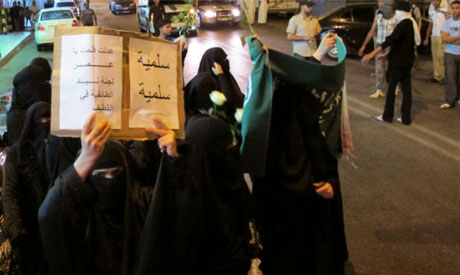
Protesters chant slogans and hold posters of prisoners during a protest in Qatif on March 9, 2011. The banner reads: "Peacefully, Peacefully," (Photo: Reuters).
Dozens of Saudis staged a rare protest against the detention of relatives held without trial for security offences in a country that escaped last year's Arab Spring unrest but has faced criticism for its human rights record.
Up to 50 people, including eight women, stood quietly on Monday outside a prosecutor's office by the side of a Riyadh road watched by uniformed policemen sitting in three police cars.
Saudi Arabia, a US ally and world's biggest oil exporter, has played a critical role in helping Western intelligence agencies foil plots by Al-Qaeda. But rights groups have faulted it for a near total lack of democracy and intolerance of dissent. Human rights groups have also accused the government of using its campaign against Islamist militants to imprison political dissidents.
Saudi Arabia says it has no political prisoners and last year said it had put on trial 5,080 of nearly 5,700 people it had detained on security charges since a series of attacks against foreign and government targets in 2003.
The Saudi embassy in London in December responded to an Amnesty International report that the authorities justified cracking down on dissent by citing security concerns by saying it was based on inaccurate information.
The protesters included adolescents and elderly people. They stood in a tight group without waving placards or shouting slogans. One woman, holding a walking stick, sat on a chair.
"My brother told me he was taken to court last year but it was a secret trial and they didn't let him choose his own lawyer. It's been over a year and we still don't have the result of the trial. In my opinion this trial is nothing but a show," said a protester, who did not want to be named for fear of arrest.
He said his brother had been arrested 11 years ago after returning from Afghanistan where he had gone to fight and that he complained of being beaten in detention.
A spokesman for the Saudi Interior Ministry was not immediately available to comment but the government has repeatedly denied using torture.
The women protesters wore traditional face-covering veils and many of the men, who also wore traditional dress, also covered their faces with their red-and-white checked Arab scarves, seemingly to hide their identities. It is unusual for women to join protests in the conservative Islamic kingdom, where gender segregation is strictly enforced.
Saudi Arabia escaped the unrest that hit Arab states last year, sweeping the leaders of Tunisia, Egypt, Libya and Yemen from power, destabilising Bahrain and causing civil war in Syria.
Soon after the revolution in Egypt, Saudi King Abdullah ordered $110 billion in social spending on benefits such as new housing and unemployment aid, while powerful religious leaders told their followers not to protest.
Despite persistent demonstrations from members of its Shi'ite Muslim minority that have continued into 2012 and a facebook campaign last spring calling for a "day of rage" the country's Sunni majority mostly stayed off the streets.
However, there have been some small protests outside Shi'ite areas since the start of last year over specific issues.
In January 2011 unemployed teachers protested in Riyadh and in Jeddah residents of an area hit by floods also demonstrated. Detainees' relatives protested in February and June last year.
In March this year thousands of students at an all-female university in Abha, in southern Saudi Arabia, boycotted lectures after police broke up a protest by some of their classmates over poor campus services.
Short link: